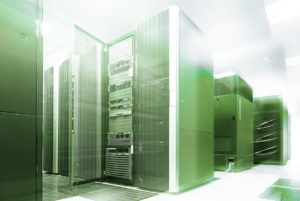Colocation Data Centers Are Exceeding Existing Performance Standards To Accommodate Retail, Wholesale, And Hyperscale Customers

You don’t have to look far to see how trends such as cloud computing and the Internet of Things have accelerated data processing and demand for more storage capacity. As a result, colocation is not only facing completely new challenges, but more modern colocation is getting smarter.
Traditional colocation largely serviced only a retail audience in the past. This meant footprints ranged from partial cabinets to medium-sized deployments. Now, viable operators are evolving to accommodate every level of customer need, from large wholesale space to the smaller retail or edge requirements. Even hyperscale data center providers like Google, Microsoft, and Amazon, who build their own data centers, are turning to qualified colocation providers to accommodate the high demand for data center space and services.
The colocation market continues to grow according to market figures. Data Center Dynamics reports growth at around 16% per year and over the next ten years; that adds up to quadruple growth by 2030. Several factors are contributing to the gains:
- Newer technology demands closer proximity to data sources or endpoint use cases, and it’s leading businesses to distribute their IT infrastructure.
- Larger hyperscale cloud data centers are usually located in remote areas, whereas colocation sites tend to be closer to urban centers.
- Data volumes can become unmanageable and even unaffordable in the cloud, marking a trend called cloud repatriation
- Businesses are prioritizing workloads to their most optimal environment rather than having an all-in-one solution called Hybrid IT.
- Enterprises are increasingly outsourcing their data center operations. Reasons include cost reduction, ease of use, resolving latency and performance issues, freeing up IT teams, reducing risks associated with managing internal data centers, or testing new markets.
- Forward-thinking colocation providers are putting energy into green initiatives that benefit businesses with ESG mandates, an effort that is very difficult to achieve with the on-premise data center.
How To Choose The Right Digital Infrastructure Model For Your Business: Retail, Wholesale, Hyperscale
In the most basic sense, colocation consists of rented space and power for customer servers and IT equipment. Yet, in recent years data center colocation is about much so more than connectivity, space, and power. Surges in demand has given rise to a much wider range of customers, but the product itself is transforming, rising to meet new standards of service as well. This includes delivering highly efficient performance, meeting higher density requirements, delivering constant uptime and consistent reliability, offering redundant networks and direct cloud connectivity, ensuring ironclad security, and driving initiatives to meet sustainability commitments. And since the market share refuses to shrink it becomes more important than ever for colocation operators to deliver space for businesses to expand.
To help understand the different customer footprints let’s take a closer look at how colocation data centers support retail, wholesale, and hyperscale use cases.
Retail Colocation Focuses On Smaller Deployments And Flexibility
 In a retail colocation model, companies lease space and power in various footprints, from a single cabinet, or a caged environment that privatizes the space and bundles several cabinets together. Within this space, customers install their own IT equipment and as a general rule, they usually pay for metered power by kilowatt-hours according to a monthly service contract. Metered power allows for more flexibility in pricing when power requirements are variable. Retail customers typically purchase the space, power, and network for lease terms set in increments of 12, 24, to 36 months.
In a retail colocation model, companies lease space and power in various footprints, from a single cabinet, or a caged environment that privatizes the space and bundles several cabinets together. Within this space, customers install their own IT equipment and as a general rule, they usually pay for metered power by kilowatt-hours according to a monthly service contract. Metered power allows for more flexibility in pricing when power requirements are variable. Retail customers typically purchase the space, power, and network for lease terms set in increments of 12, 24, to 36 months.
Colocated companies may have limited control over the equipment that supports their servers such as racks, cabling layout, power, cooling, or fire suppression systems. Yet, while customers cannot alter the layout or design of the data center, they still enjoy a host of amenities. Plus sharing the costs with several tenants drives greater overall efficiency and cost savings. In the retail colocation environment, customers receive maximum flexibility to house workloads for shorter periods of time such as test development applications, workloads that are subject to transitional IT requirements, or disaster recovery workloads to replicate mission-critical applications. Meanwhile, customers can entirely avoid the risks associated with managing their own data center and free up their IT staff to deliver greater value in forward thinking initiatives.
Wholesale Colocation Appeals To Larger Customers Requiring Greater Customization and Control
In cases where your business IT environment is well established, it makes sense to store larger volumes of data that run the core business applications from a stable location and over a longer duration of time. Wholesale colocation is preferable for companies because they benefit from the robust resiliency of a purpose-built facility.
These customers can achieve greater control when it comes to designing their own space. Space is offered to wholesale customers via private cages or custom-designed data halls, which meshes well with customers that require enhanced security or customized compliance requirements. Wholesale customers generally select larger lease commitments garnering additional cost stability and savings.
In the wholesale model, businesses have two different options. The first wholesale model occurs when businesses lease what is called core and shell space in a data center. Customers bring all their own resources to design and build the existing shell to meet their exact specifications. This includes designing the mechanical, electrical, and cooling backplane, negotiating their own power contracts, and more. Customers who select this option tend to use their own security and operations teams to manage the space, in addition to bringing their own racks and cabinets and finally IT equipment.
The second wholesale model involves leasing a dedicated data hall in a colocation facility where the space is already purpose-built for performance but designed for private customers to control a specific suite or dedicated data hall. While customers won’t be building the space to suit, space is ready on demand and generally offers some customization enhancements. The colocation facility teams then augment by delivering full operational services, rack, and cabling installation, management of the space, and in some cases remote hands services. Yet the wholesale customers still have all the benefits of shared space with the privacy they require.
In both these cases, a wholesale commitment requires much bigger chunks of space and power, usually in 1-3 megawatts or larger increments. Wholesale contracts offer greater savings as power contracts can be negotiated directly with power suppliers and longer-term contracts deliver pricing advantages that cannot be offered to smaller customers.
Wholesale colocation is an ideal model for larger enterprises, content distribution providers, or media providers. Companies can also combine wholesale approaches in some locations where business growth is substantial and use smaller retail deployments in areas where their IT or edge needs are still evolving.
Hyperscalers Select Colocation Providers Capable of Exceeding Performance Norms
Hyperscale data centers are a type of wholesale colocation that is engineered to match very specific technical and operational requirements of hyperscale companies such as Amazon, Alibaba, Facebook, Microsoft, and a few others. Where retail colocation tends to draw power in kilowatts, hyperscalers need significant power and space consumed in multi megawatts to support the thousands of servers stored across their massive facilities. Hyperscalers build their own facilities to meet these massive requirements in the 10, 20, and 50 megawatts.
So why would a hyperscale company need smaller deployments with a colocation data center company when they build their own mega facilities? According to Global Market Insights, the hyperscale market is expected to rise from $20 billion in 2018 to $65 billion by 2025 – a stunning increase of 225%. Given the exponential growth in the industry, these huge organizations cannot always accommodate such steep growth projections alone. Qualified colocation providers that have offerings beyond traditional colocation models may earn hyperscale business. To name a few examples this would include providers who have larger data center blocks available, make sustainability a priority, offer competitive financing options, ensure rapid facility expansion and active construction supply chains, and have tight operation and security measures in place. The ability to provide such service and exist in non-traditional geographies adds considerable value to a colocation partnership for several of the largest data center builders in the world.
—-
About Element Critical
Element Critical powers the digital infrastructure of the future, housing hundreds of customers and companies that enjoy premium and reliable space and power using either the retail, wholesale, or hyperscale model.
As a leading provider of tailored data center services, Element Critical offers unique value through our focused approach to personalized customer service and high-performance operational efficiency. With Tier III facilities in key markets, Element Critical consistently delivers hybrid-ready data center services that are engineered to meet the requirements of enterprise businesses and technology leaders. Element Critical’s platform includes carrier-neutral data centers in Chicago, Austin, Houston, Silicon Valley, and Northern Virginia. These campuses comprise 57 MW of critical IT capacity. In addition, Element Critical is expanding facilities in Houston, Silicon Valley, and Chicago. For more information, visit www.elementcritical.com and connect with our specialists at [email protected]
